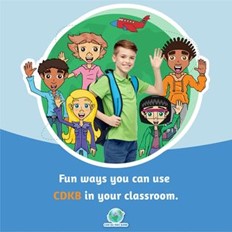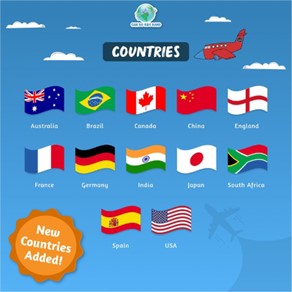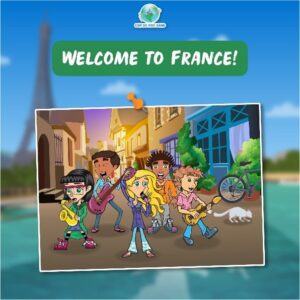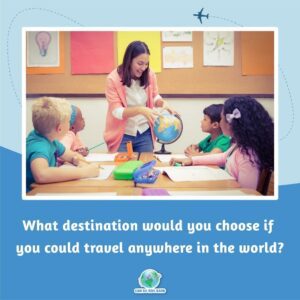Can Do Kids Travel Adventures
By Dr Charles Margerison
Psychologist
Project-Based Learning
How do students, between the ages of 8 – 12, learn how to understand the world beyond their own country?
How can we support that understanding through Geography and Social Studies by bringing intercultural education into the classroom?
In our work with Primary level students, we recognize that they learn best when engaged and active. Therefore, we focus on practical projects that involve group discussions.

These are based on visits to different countries with an animated group called the Can Do Kids Band. The band have five teenage members.
– Ravi is a quiet and calm bass guitarist from India.
– Amy is the extroverted lead singer, who was born in the USA.
– Ace comes from South Africa, and beats out hot rhythms on the drums.
– Lin, who was born in China, has exceptional skills on piano and the electronic keyboard.
– Oz, from Australia, is the lead guitarist and enjoys the outdoor life.
With the support of a benefactor, they visit schools in different countries. In each one, they learn from students about their country and culture. In the process, they are introduced to local songs and folk stories.
International Education
This approach provides an intriguing basis for classroom discussions about people and places in different parts of the world.
Through realistic projects, students develop their own Can Do Kids Travel Adventures. They plan visits to countries like Brazil, France, Canada, and many others, As they do so, they learn in practical ways, about communities, customs and cultures

Key topics are outlined as a basis for discussion about each country. These include –
- Food
- Sport
- Employment
- Population
- Beliefs
- Environment
- Lifestyle
Online Resources For Inter-cultural Learning
To support students in their understanding of each country, we have created the website www.candokidsband.com .
This enables students to explore a country through interactive games and exercises on the website. This can be done both before classroom lessons, to set the scene, and also after a lesson as learning reinforcement.
Students indicate they enjoy their virtual travel adventures. In the process, they develop their language skills by discussing people and places.
Learning Applications
Teachers have developed a range of lesson designs. Here are some examples.
A Virtual Country Visit – Example – France
1 – Outline – 5 minutes – The teacher indicated the aim was to see a video about France featuring the Can Do Kids Band – an animated group who help students learn about countries.
2- Video – 5 minutes – A short video of the Can Do Kids Visit to France is shown. The students are asked to look for things that interest them about France.
3 – Discussion – 15 minutes – Students shared their views, in groups of four or five and develop teamwork skills.
4 – Presentations – 10/15 minutes – Each group presented the key points arising from their discussion.
5 – Review – 10 minutes – The teacher commented on each presentation, and added information as required.

Students can then be asked to write up their notes and visit the website.
Travel Projects
Longer term applications have been developed by teachers linked to projects. These can cover a number of lessons. Examples include:-
Project A – Travel Agency – Students were asked to act as travel agents, and choose countries for their clients to visit. In weekly discussion groups, the students shared views on the key points about each country, prior to a presentation to their class.
Project B – Tourist Guides – Students met in small groups. They were asked to be tourist guides for a country of their choice, using the website as an information resource. After the group discussions, they made a class presentation on one particular place, or various areas.
Project C – Travel Publishers – Students were asked to plan a tour of a country, and to develop a map of the places on their itinerary. They used the web-based resources to identify the main places to visit. In group discussions, they shared information, and prepared a presentation for their class.

Summary
These activities helped students to develop research skills and group work. It also gave students a practical understanding of why Geography and Social Studies are important subjects.
In the process, students developed their awareness of intercultural education regarding different ways of life.
These projects involved a lot of fun and laughter, which strengthens respect and understanding between students.









